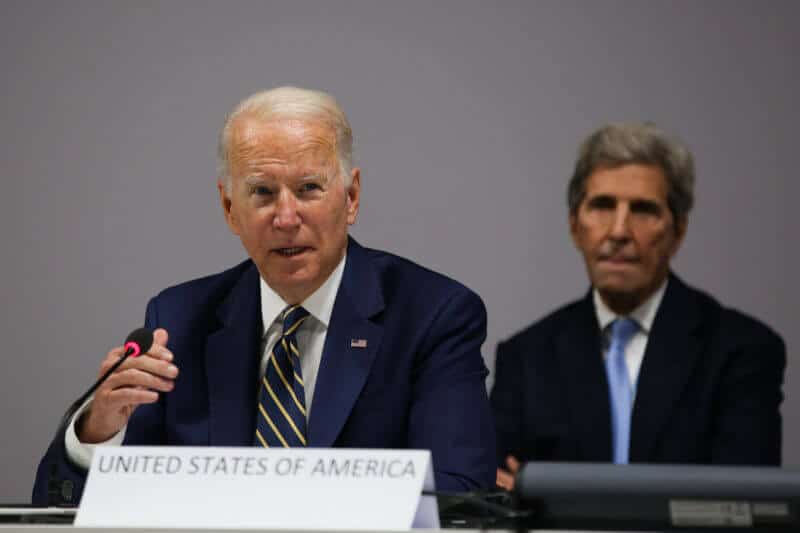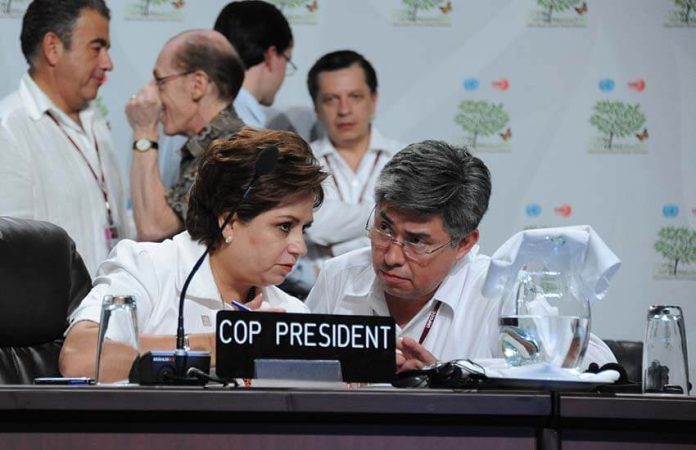The United Nations Climate Change Conference (COP26) in Glasgow, which begins this week and ends on November 12, is occurring at a particularly critical time for the future of humankind and planet Earth. Lessons from the COVID-19 pandemic, which postponed the COP26 in 2020, must force us all to reflect on the significance of solidarity among rich and poor nations — for the safety of everyone on the planet.
The concrete results of this climate summit are uncertain. China’s ambition and pledges, as the principal global emitter of greenhouse gases (GHGs), are disappointing — President Xi Jinping, a chemical engineer who is also general secretary of the Chinese Communist Party, did not even attend the summit. Russian President Vladimir Putin also didn’t show up despite his country being the world’s fourth largest GHG emitter.
However, some powerful countries such as the United States (the world’s second highest GHG emitter) and those of the European Union (the world’s third highest GHG emitter) seem to be keen on doing what it takes to ensure the conference is a success. At the Copenhagen COP15 in 2009, rich countries promised to mobilize US $100 billion a year by 2020 to help developing countries adapt to the impacts of climate change and mitigate GHGs. Those pledges were reiterated at the Paris COP21 in 2015 but were not fulfilled. Will the U.S., the European Union and other rich countries deliver on their promise in Glasgow?
Mexico has played an important role in previous climate change summits, in particular as host and president of the Cancún COP16 in 2010. According to the secretariat of the U.N. Framework Convention on Climate Change (UNFCCC) at the time, that conference “produced the basis for the most comprehensive and far-reaching international response to climate change the world had ever seen to reduce carbon emissions and build a system which made all countries accountable to each other for those reductions.”
In Cancún, the parties agreed to commit to a maximum temperature rise of 2 C above preindustrial levels and to consider lowering that maximum to 1.5 degrees, as well as establishing a Green Climate Fund to provide financing for developing countries. They also agreed to the Cancún Adaptation Framework to promote the implementation of stronger action on adaptation in order to reduce vulnerability to climate change and build resilience in developing countries.

Will Mexico show the same kind of leadership at the COP26 in Glasgow?
For U.S. President Joe Biden, the conference is crucial because one of his main presidential campaign pledges was to deal with climate change. Also, the Paris Accord, negotiated in 2015, was a large part of Biden’s and (his boss at the time) President Barak Obama’s legacy. At his own inauguration, President Biden signed an executive order reinstating the U.S. into the Paris Accord after his climate-denying predecessor Donald Trump had withdrawn from the agreement.
We can therefore expect that, in Glasgow and over the next two weeks, the U.S. and the European Union will use their traditional carrot and stick policy to try to convince the leaders of other countries to augment their pledges on reduction of GHGs. But let’s make no mistake: if global temperatures rise beyond the crucial threshold of 1.5 degrees, the consequences to all nations, rich and poor, will be dire and the suffering of billions across the world unimaginable. Our future and that of life on Earth are on the line.
This is what thousands of scientists around the world are saying, and the enormous wealth of evidence is irrefutable.
In a report published this August — based on more than 14,000 scientific studies and supported by 195 nations — the Nobel Laureate Intergovernmental Panel on Climate Change (IPCC) concluded that countries had delayed actions to reduce fossil fuel-driven GHGs for so long that many of the impacts of climate change are already irreversible; that we cannot avoid global warming and its intensification over the next 30 years, and some of its most dreadful consequences are already inevitable; and that the situation will get even worse if we do not drastically reduce global emissions in this decade.
The COP26 is not just one more conference. There is much at stake for us and for the planet. The outcome of this summit depends on the tangible and ambitious pledges that countries and international funding agencies bring forward to contribute to achieving the global goals that the United Nations has put forward.
And, of course, those pledges will be contingent on all parties delivering on their promises — which, as we all know, is the weak side of global summits and multilateral agreements.
The goals of the COP26 are grouped into four sections: mitigation (meaning securing global net-zero GHGs by 2050 and keeping the 1.5-degree goal within reach); adaptation (i.e., urgently adapting policies to protect communities and natural habitats); finance (mobilizing enough resources to deliver on the previous two goals); and collaboration (governments, businesses, and civil society working together to deliver on any pledges or goals).
It should be crystal clear that success or failure in Glasgow heavily depends on the ambitions and moral principles of every leader in every country. In the end, we elected them precisely to deliver at times of crisis such as climate change.
Mexico is the 13th highest GHG emitter and the second in Latin America, after Brazil. I don’t know what pledges the Mexican delegation will bring to Glasgow. One can, however, derive some insight based on what the current federal administration has done in its first three years.
I will focus on what may be the most crucial goal of the COP26: mitigation of greenhouse gases. Both the actions and the omissions of Mexico’s government offer insight into what we (and the world) can expect from its delegation attending the summit.
According to UNFCCC executive secretary Patricia Espinosa (a Mexican citizen) and the United Kingdom (as the COP26 host and president), in order to reach GHG mitigation goals and avoid global temperatures exceeding the 1.5-degree precipice countries must pledge (and deliver on those pledges) to substantially reduce their emissions by 2030. This will be possible only if the participating nations accelerate their reduction of fossil fuel use, decrease deforestation and encourage investment in renewable energies.

In Mexico, achieving those goals looks extremely difficult in light of what we have seen so far of the current administration’s energy policy, which has been essentially centered on strengthening the state oil company Pemex and the Federal Electricity Commission (CFE), in what seems an awkward race to accelerate oil and gas extraction. It’s an energy policy that many experts say creates major obstacles to and disincentivizes investment in renewable energies, particularly solar and wind power.
The construction of the Dos Bocas oil refinery in Tabasco and the “modernization” of another six refineries in Cadereyta, Nuevo León; Ciudad Madero, Tamaulipas; Minatitlán, Veracruz; Salina Cruz, Oaxaca; Salamanca, Guanajuato; and Tula, Hidalgo, leaves no doubt whatsoever about the government’s preference for fossil fuels. Add to that the Deer Park refinery in Texas that Pemex recently bought from the Shell company.
With regards to deforestation, according to the U.N.’s Food and Agriculture Organization, between 2010 and 2020, Mexico lost more than 1.2 million hectares of forests (128,000 hectares were lost in 2020). And all this is happening while the country’s main environmental agencies are being weakened as never before.
Clearly, Mexico’s climate policy is inconsistent with the pledges the country made as part of the 2015 Paris Accord. And our current policies are not consistent with what is expected from countries at Glasgow in 2021.
In Paris, Mexico made ambitious pledges that were later reflected in its first Nationally Determined Contributions (NDC) — i.e., its stated goals in domestic climate change mitigation and adaptation. It was the first developing country to submit them in 2016, and these pledges were later ratified by the Mexican Congress.
In 2021, however, Mexico presented a revised NDC that falls below its original pledge and also well below the equitable contribution that the country needs to make toward efforts in avoiding the planet warming more than 1.5 degrees.
If Mexico’s proposed electricity reform is approved, the nation will continue to fall short of its international climate change commitments. The major source of GHG (60–70%) is energy production, and the production of electricity is the activity that contributes to most of these gases.
Instead of diversifying energy sources and markets, the electricity reform will mean that the CFE produces the majority of its electricity from fossil fuels — the most inefficient, costly and polluting energy source.
If the electricity reform is passed by Congress in its current form, it will have serious environmental implications, not only for climate but also for the health and economy of all Mexicans.
As many experts have said, the reform would also raise electricity prices. For the first time, Mexicans were beginning to see a competitive electric market with a diversity of sources and a wide array of actors — which is healthy in a marketplace if your goal is competitiveness and lower prices for citizens. Thanks to such diversification and the issuing by Mexico of clean energy certificates, in 2017 the country achieved the world’s lowest solar energy price at US $17.7/MWh.
I fear that Mexico will arrive in Glasgow this week with pledges far below what is needed at these crucial global climate negotiations. I hope I’m proved wrong because, with Brazil President Jair Bolsonaro’s well-known disdain for climate issues and negligence that is accelerating the Amazon’s destruction, the world needs a strong Latin American country willing to take the lead. For both humanity and our planet.
Omar Vidal, a scientist, was a university professor in Mexico, is a former senior officer at the UN Environment Program, and former director-general of the World Wildlife Fund–Mexico.
